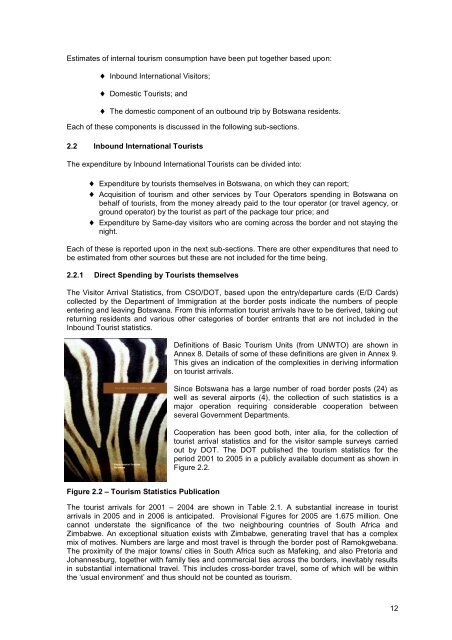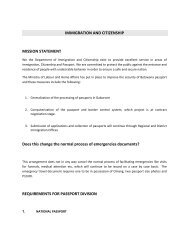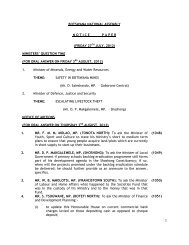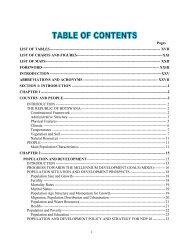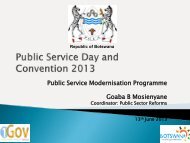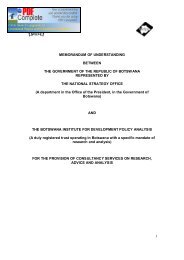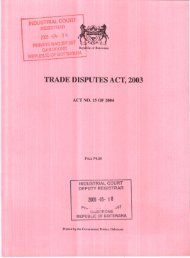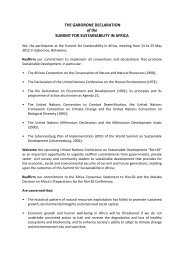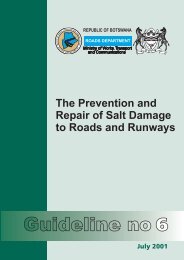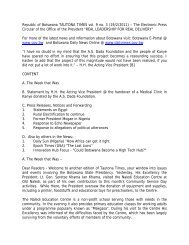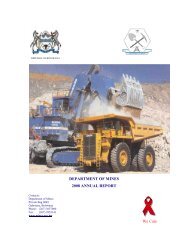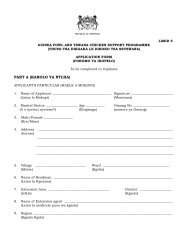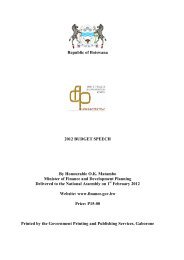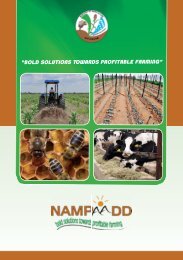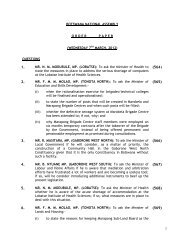Tourism Statistics - Government of Botswana
Tourism Statistics - Government of Botswana
Tourism Statistics - Government of Botswana
You also want an ePaper? Increase the reach of your titles
YUMPU automatically turns print PDFs into web optimized ePapers that Google loves.
Estimates <strong>of</strong> internal tourism consumption have been put together based upon:<br />
Inbound International Visitors;<br />
Domestic Tourists; and<br />
The domestic component <strong>of</strong> an outbound trip by <strong>Botswana</strong> residents.<br />
Each <strong>of</strong> these components is discussed in the following sub-sections.<br />
2.2 Inbound International Tourists<br />
The expenditure by Inbound International Tourists can be divided into:<br />
Expenditure by tourists themselves in <strong>Botswana</strong>, on which they can report;<br />
Acquisition <strong>of</strong> tourism and other services by Tour Operators spending in <strong>Botswana</strong> on<br />
behalf <strong>of</strong> tourists, from the money already paid to the tour operator (or travel agency, or<br />
ground operator) by the tourist as part <strong>of</strong> the package tour price; and<br />
Expenditure by Same-day visitors who are coming across the border and not staying the<br />
night.<br />
Each <strong>of</strong> these is reported upon in the next sub-sections. There are other expenditures that need to<br />
be estimated from other sources but these are not included for the time being.<br />
2.2.1 Direct Spending by Tourists themselves<br />
The Visitor Arrival <strong>Statistics</strong>, from CSO/DOT, based upon the entry/departure cards (E/D Cards)<br />
collected by the Department <strong>of</strong> Immigration at the border posts indicate the numbers <strong>of</strong> people<br />
entering and leaving <strong>Botswana</strong>. From this information tourist arrivals have to be derived, taking out<br />
returning residents and various other categories <strong>of</strong> border entrants that are not included in the<br />
Inbound Tourist statistics.<br />
Definitions <strong>of</strong> Basic <strong>Tourism</strong> Units (from UNWTO) are shown in<br />
Annex 8. Details <strong>of</strong> some <strong>of</strong> these definitions are given in Annex 9.<br />
This gives an indication <strong>of</strong> the complexities in deriving information<br />
on tourist arrivals.<br />
Since <strong>Botswana</strong> has a large number <strong>of</strong> road border posts (24) as<br />
well as several airports (4), the collection <strong>of</strong> such statistics is a<br />
major operation requiring considerable cooperation between<br />
several <strong>Government</strong> Departments.<br />
Cooperation has been good both, inter alia, for the collection <strong>of</strong><br />
tourist arrival statistics and for the visitor sample surveys carried<br />
out by DOT. The DOT published the tourism statistics for the<br />
period 2001 to 2005 in a publicly available document as shown in<br />
Figure 2.2.<br />
Figure 2.2 – <strong>Tourism</strong> <strong>Statistics</strong> Publication<br />
The tourist arrivals for 2001 – 2004 are shown in Table 2.1. A substantial increase in tourist<br />
arrivals in 2005 and in 2006 is anticipated. Provisional Figures for 2005 are 1.675 million. One<br />
cannot understate the significance <strong>of</strong> the two neighbouring countries <strong>of</strong> South Africa and<br />
Zimbabwe. An exceptional situation exists with Zimbabwe, generating travel that has a complex<br />
mix <strong>of</strong> motives. Numbers are large and most travel is through the border post <strong>of</strong> Ramokgwebana.<br />
The proximity <strong>of</strong> the major towns/ cities in South Africa such as Mafeking, and also Pretoria and<br />
Johannesburg, together with family ties and commercial ties across the borders, inevitably results<br />
in substantial international travel. This includes cross-border travel, some <strong>of</strong> which will be within<br />
the „usual environment‟ and thus should not be counted as tourism.<br />
12


